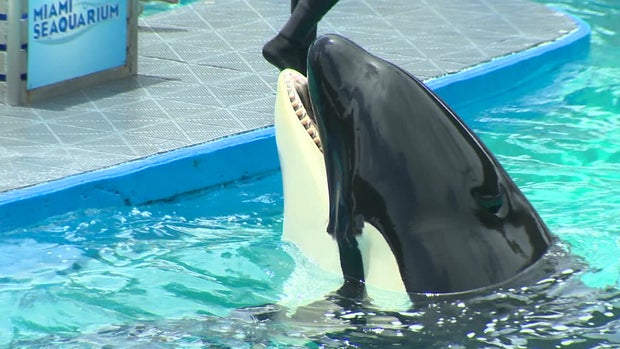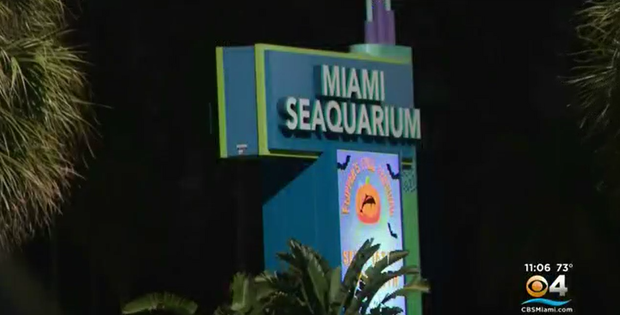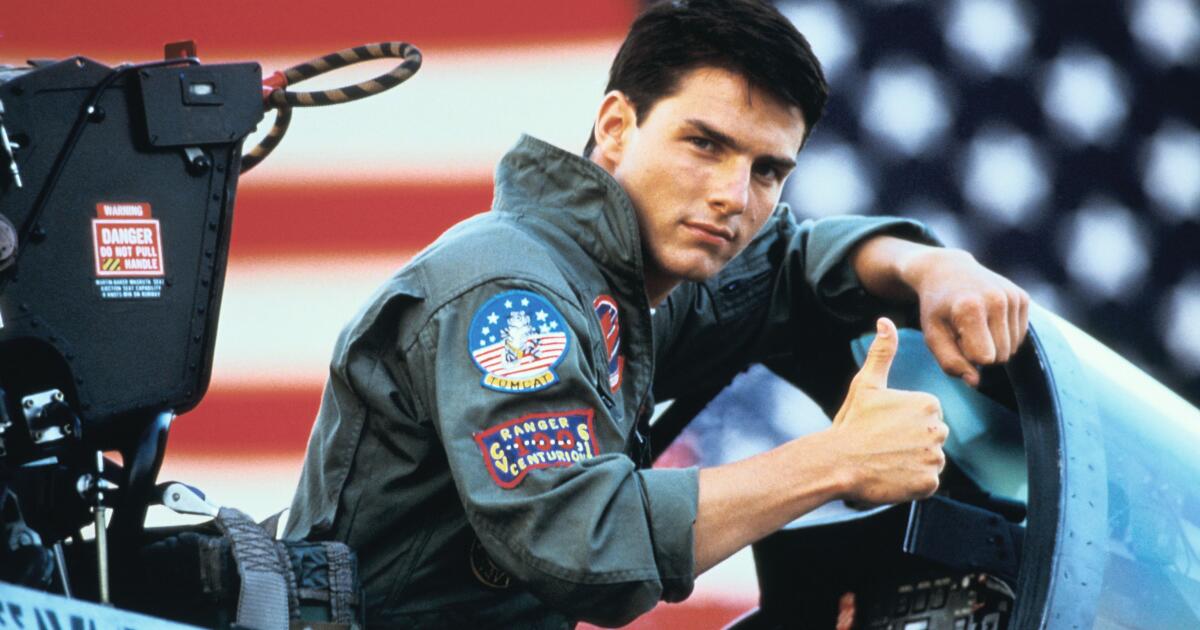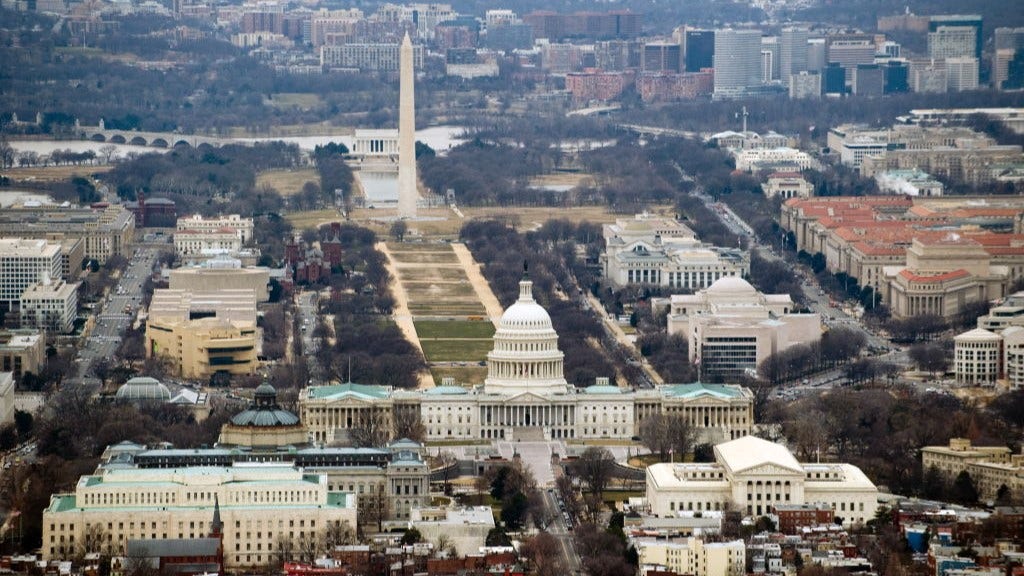Miami, FL
USDA cites Miami Seaquarium for insufficient animal care, staffing problems; report infuriates local leaders, PETA

MIAMI — The U.S. Department of Agriculture (USDA) has cited the Miami Seaquarium for alleged insufficient animal care and staffing problems, causing frustration for many Miamians.
The five-page report, which was completed in July, stated that USDA inspectors cited the Miami Seaquarium for multiple violations in the first half of 2023, including inadequate veterinary care, animal handling, facilities, employees and/or attendants, and critical separation.
The report was published a month after Miami Seaquarium’s Lolita — a 57-year-old orca — died in captivity due to old age and multiple chronic illnesses.
Inadequate veterinary care
According to the USDA, Miami Seaquarium “failed to recognize veterinary authority” when Elelo the Pacific white-sided dolphin was treated for “foreign body ingestion” earlier this year.
On January 3, after Elelo went under treatment for foreign body ingestion, the attending veterinarian (AV) determined that his enclosure was no longer suitable for the animal and recommended he be transferred to another facility. However, that transfer didn’t happen at the time of inspection, according to the USDA.
Later on July 6, after noting continued foreign body ingestion by Elelo, the AV determined that Miami Seaquarium did not have the equipment to keep the animal in its current facility and had to undergo a “significant amount of maintenance” and that there was a “repeat risk of foreign body ingestion.” According to the USDA, the AV stated that she contacted the administration to try and expedite the process and planned to relocate Elelo to another facility as mentioned earlier.
It was also reported by several employees that a newly appointed corporate dolphin trainer was instructing employees to not contact the AV and undermine her authority, which created a “very stressful environment,” the USDA stated. Additionally, a “Chain of Command” chart was on display inside the trainer’s office that showed he was the highest authority and did not include the AV.
When asked about it, the trainer told inspectors he did not report to facility management but instead answered to two corporate personnel. Also, numerous other employees reached out anonymously but hesitated to give statements because of “fear of retaliation,” the USDA stated.
“Failure to ensure that the attending veterinarian has appropriate authority over the veterinary care of the animals can lead
to unnecessary stress, discomfort, and suffering of the animals,” the report stated. “Each dealer and exhibitor shall assure that the attending veterinarian has appropriate authority to ensure the provisions of adequate veterinary care and to oversee the adequacy of other aspects of animal care and use.”
According to the USDA, Miami Seaquarium failed to provide proper equipment and services to ensure adequate veterinary care in one other instance.
On July 5, the AV noted that the gastroscope was “very outdated” and not working, and recommended purchasing a new system. However, that request was not approved at the time of the report. Additionally, Miami Seaquarium reportedly does not own any scales, so at least three adult manatees held at the facility have not been weighed in over five years, the USDA stated.
“Properly functioning equipment is necessary for diagnosing, treating and maintaining the health of the animal,” the report stated. “Accurate weights are essential for dosing medications and providing adequate routine care.”
Animal handling
On March 19, a visitor of Miami Seaquarium was bitten on the hand by Gemini the dolphin at Dolphin Harbor during a meet-and-greet event with another dolphin in the facility.
According to the USDA, Gemini broke from station and swam toward a group of guests as they had their hands on the water’s surface, waiting to touch the other dolphin as they swam by. As trainers instructed guests to remove their hands, Gemini “popped up and grabbed” a girl’s hand. The girl pulled her hand out of the water with Gemini still holding onto her. Gemini did eventually let go of her hand but stayed in front of the guests as they stood up.
“Inadequate handling or control of animals during public interactions can lead to injury of the public and the animals,” the USDA stated. “During public exhibition, any animal must be handled so there is minimal risk of harm to the animal and to the public.”
Facilities
According to the USDA, Miami Seaquarium failed to maintain two different marine animal enclosures.
The first of which was Elelo’s enclosure, which led the dolphin to ingest several objects, including a plastic zip-tie, a broken piece of plastic and what was described to be a “large piece of cement, which were all found during his January 3 gastroscopy. According to the USDA, the zip-tie was used to secure pool fencing, the plastic was likely from a target pole and divers noted that the bottom of the pool had a layer of “broken, flaking cement.”
During the second procedure on July 5, Elelo was made to regurgitate “sand and glass filtration media,” according to the USDA.
“Enclosures that fall into states of disrepair may no longer be able to safely contain the animals and may produce foreign material which could be ingested and become injurious to the animals,” the report stated. “Indoor and outdoor housing facilities for marine mammals must be structurally sound and must be maintained in good repair to protect the animals from injury.”
Meanwhile, Miami Seaquarium was noted to have failed to provide weather and sunlight protection for one of its manatee enclosures. According to the USDA, records indicated that the overhead tarp was removed for 10 days in March and for an unspecified amount of days in April, which left the housed adult male manatee without any natural or artificial shade.
“Direct sunlight can adversely affect the animal’s health, especially skin and eye health,” the USDA stated. “Natural or artificial shelter shall be provided for all marine mammals kept outdoors to afford them protection from the weather or from direct sunlight.”
According to the report, this citation was corrected at the time of inspection.
Employees or attendants
According to the USDA, Miami Seaquarium also failed to maintain a sufficient number of trained employees.
On March 27, the termination of an associate veterinarian resulted in a single person caring for the facility’s 46 marine animals and “hundreds of birds, fish, sharks and rays” housed by Miami Seaquarium; as a result, all routine samples were placed on hold to prioritize non-routine/unwell animals.
By June 17, three veterinary technicians resigned, leaving only one person with zero full-time support staff. At the time of inspection, the USDA noted, that only one of the four available positions was filled and two associate veterinarian positions remained open, continuing the prioritization of sick and urgent cases until additional staff could be obtained.
“Insufficient staffing can result in poor husbandry practices and the inability of the veterinary team to provide routine care
and maintenance of the animals,” the USDA stated.
“A sufficient number of adequately trained employees or attendants, responsible to management and working in concert with the attending veterinarian, must be utilized to maintain the prescribed level of husbandry practices,” the report added.
Critical separation
On February 27, a CT scan performed on Bimini — a 23-year-old female dolphin — found that she had multiple rib fractures in various stages of healing. According to the USDA, these injuries were incidental findings and determined to be likely caused by “conspecific aggression.” Once Miami Seaquarium learned of the injuries, it placed Bimini in a safer group.
However, the USDA noted that housing incompatible animals together can negatively impact their health and welfare, and may cause serious injury or even death.
“Marine mammals must not be housed in the same enclosure nor be housed near other animals that cause them unreasonable stress, discomfort or interfere with their good health,” the USDA stated.
Meanwhile, Romeo — an adult male manatee — had been housed alone in his enclosure because the three other manatees he was living with were released back into the wild in the spring. According to the USDA, manatees are semi-social animals and do better medically and psychologically when they’re housed in pairs or groups. However, despite numerous attempts to acquire another manatee, Miami Seaquarium did not meet the requirements to do so.
“Marine mammals, whenever known to be primarily social in the wild, must be housed in their primary enclosure with at least one compatible animal of the same or biologically related species,” the USDA stated.
The USDA’s report has angered many in the community, including local leaders and animal rights activists. Since the release of this report, People for the Ethical Treatment of Animals (PETA) has urged county officials to shut down the Miami Seaquarium and has received nearly 24,000 supporters of its petition.
And this is not the first time that the USDA has made troubling findings at the facility. Back in October 22, Miami-Dade County Mayor Daniella Levine Cava issued a plan for action after the USDA found that dolphins were being underfed at Miami Seaquarium, calling the report “deeply disturbing.”

Miami, FL
CBS News Miami’s Jim Berry on UM hoops coach Jim Larrañaga

Watch CBS News
Be the first to know
Get browser notifications for breaking news, live events, and exclusive reporting.
Miami, FL
Trade Proposal: Miami Heat Acquire Star Forward From Brooklyn Nets

It doesn’t seem like those Miami Heat rumors will slow down anytime soon.
The Heat are one of many teams newly linked to Brooklyn Nets forward Cam Johnson. With speculation surrounding star Jimmy Butler, the Heat could make a move for Johnson. He was a 2019 first-round pick.
A potential trade between the Miami Heat and Brooklyn Nets could look like:
Miami Heat receive: F Cam Johnson, G Shake Milton
Brooklyn Nets receive: G Terry Rozier, 2029 first-round draft pick
For the Heat, Johnson becomes a consistent strong presence at forward. This season, he is averaging 20 points while shooting near 50 percent from the field for a rebuilding Nets team. The good thing about trading for Johnson is he isn’t just a half-season rental. He is on the books through the 2027 season. In this trade, the Heat also acquire guard Shake Milton, who has provided numerous solid games throughout his career. He could serve as a backup guard for a team that just lost Dru Smith for the season.
For the Nets, they are in a rebuild since moving on from their Big Three of Kevin Durant, James Harden and Kyrie Irving. They traded Dennis Schroder to the Warriors last week, signaling they’re willing to move significant pieces prior to the trade deadline. Acquiring Terry Rozier could give the Nets a scorer who has shown he can perform at a high level. However, the big piece of the deal is the unprotected 2029 first-round draft pick, which could be valuable down the line. The Nets could start stockpiling on draft picks by moving more players.
If the Heat make a move for Johnson, he could help the team re-establish themselves as contenders in the East.
Sean Jordan is a contributor to Miami Heat On Sports Illustrated. He can be reached at sjorda06@syr.edu.
Follow our coverage on Facebook
X: @SeanKJordan
Miami, FL
Jalen Suggs leads Orlando Magic in loss to Miami Heat

After carrying the load offensively all night for a shorthanded Orlando Magic squad, the only thing Jalen Suggs could do was watch Tyler Herro as he sunk the game-winning shot for the Miami Heat to cap off a thriller from the Kaseya Center Thursday night.
The former Kentucky star spoiled a big night from the Gonzaga standout. Suggs finished with a game-high 29 points on 10-of-22 shooting from the field, but it wasn’t enough as the Heat stormed back in the second half to beat the Magic, 89-88, on a 19-foot jumper in the final seconds from Herro.
“Sometimes you’ve just gotta tip your cap,” Suggs said of Herro’s go-ahead basket. “Even the last possession, I thought TQ [Trevelin Queen] played great defense, good contest, tough shot. So sometimes you’ve just gotta give the guy some props.”
Jalen Suggs the man that you are pic.twitter.com/WGhKQ358rT
— Orlando Magic (@OrlandoMagic) December 27, 2024
The Magic leaned heavily on its 6-foot-5 guard from start to finish — as has been the case lately without Paolo Banchero and Franz Wagner in the lineup due to injury. Suggs came into Thursday averaging 18.4 points in 29.5 minutes over his last five contests. The Heat had a track record of stifling No. 1 options as of late, though that certainly wasn’t the case when trying to slow the Magic’s go-to guy.
Suggs and company scored the first 14 points of the night and took a commanding 22-5 lead after the former fifth-overall pick knocked down back-to-back 3-pointers in the first quarter.
Jalen Suggs alley-oop pass to Goga Bitadze who converts pic.twitter.com/uS8OrqpieI
— The Magic Way (@MagicFilmRoom) December 27, 2024
The Heat chipped into the Magic’s lead heading into the second quarter before Suggs checked back in for the final minutes of the first half. He helped push the lead back to 14 points with a midrange jumper to make it 40-26, followed later by a 23-foot jumper. With just over a minute remaining, Suggs connected with Goga Bitadze on an alley-oop to make it 50-40 in favor of the Magic.
Jalen Suggs creates space and drills the mid range jumper pic.twitter.com/oOLp85lhMB
— The Magic Way (@MagicFilmRoom) December 27, 2024
Orlando led by 10 going into the fourth quarter before the Heat scored six points in a 45-second span to make it 71-67 with 11:14 to play in regulation. Alec Burks went 3-for-3 at the charity stripe upon drawing a foul from Anthony Black while shooting from long distance. Burks connected on his next try from 25 feet on the ensuing possession.
After former UCLA standout Jaime Jaquez Jr. made it a 1-point game, Burks put the Heat out in front 77-76 with 7:42 left. Suggs scored four points in a row to tie things at 80 apiece, but from there it was all Miami down the stretch.
Herro finished with a team-high 20 points. Jaquez Jr. had 15 points while Burks and Terry Rozier combined to score 31 points off the bench for the Heat (15-13).
Tristan da Silva tallied 18 points and Bitadze recorded a 10-point, 14-rebound double-double but the Magic (19-13) suffered a loss for the fourth time in its last six contests.
MORE GONZAGA NEWS & ANALYSIS
FOLLOW US ON SOCIAL MEDIA
Continue to follow our Gonzaga coverage on social media by liking us on Facebook and following us on Instagram and Twitter.
-
/cdn.vox-cdn.com/uploads/chorus_asset/file/24924653/236780_Google_AntiTrust_Trial_Custom_Art_CVirginia__0003_1.png)
/cdn.vox-cdn.com/uploads/chorus_asset/file/24924653/236780_Google_AntiTrust_Trial_Custom_Art_CVirginia__0003_1.png) Technology1 week ago
Technology1 week agoGoogle’s counteroffer to the government trying to break it up is unbundling Android apps
-

 News1 week ago
News1 week agoNovo Nordisk shares tumble as weight-loss drug trial data disappoints
-

 Politics1 week ago
Politics1 week agoIllegal immigrant sexually abused child in the U.S. after being removed from the country five times
-

 Entertainment1 week ago
Entertainment1 week ago'It's a little holiday gift': Inside the Weeknd's free Santa Monica show for his biggest fans
-

 Lifestyle1 week ago
Lifestyle1 week agoThink you can't dance? Get up and try these tips in our comic. We dare you!
-
/cdn.vox-cdn.com/uploads/chorus_asset/file/25672934/Metaphor_Key_Art_Horizontal.png)
/cdn.vox-cdn.com/uploads/chorus_asset/file/25672934/Metaphor_Key_Art_Horizontal.png) Technology4 days ago
Technology4 days agoThere’s a reason Metaphor: ReFantanzio’s battle music sounds as cool as it does
-

 Technology1 week ago
Technology1 week agoFox News AI Newsletter: OpenAI responds to Elon Musk's lawsuit
-

 News5 days ago
News5 days agoFrance’s new premier selects Eric Lombard as finance minister




















